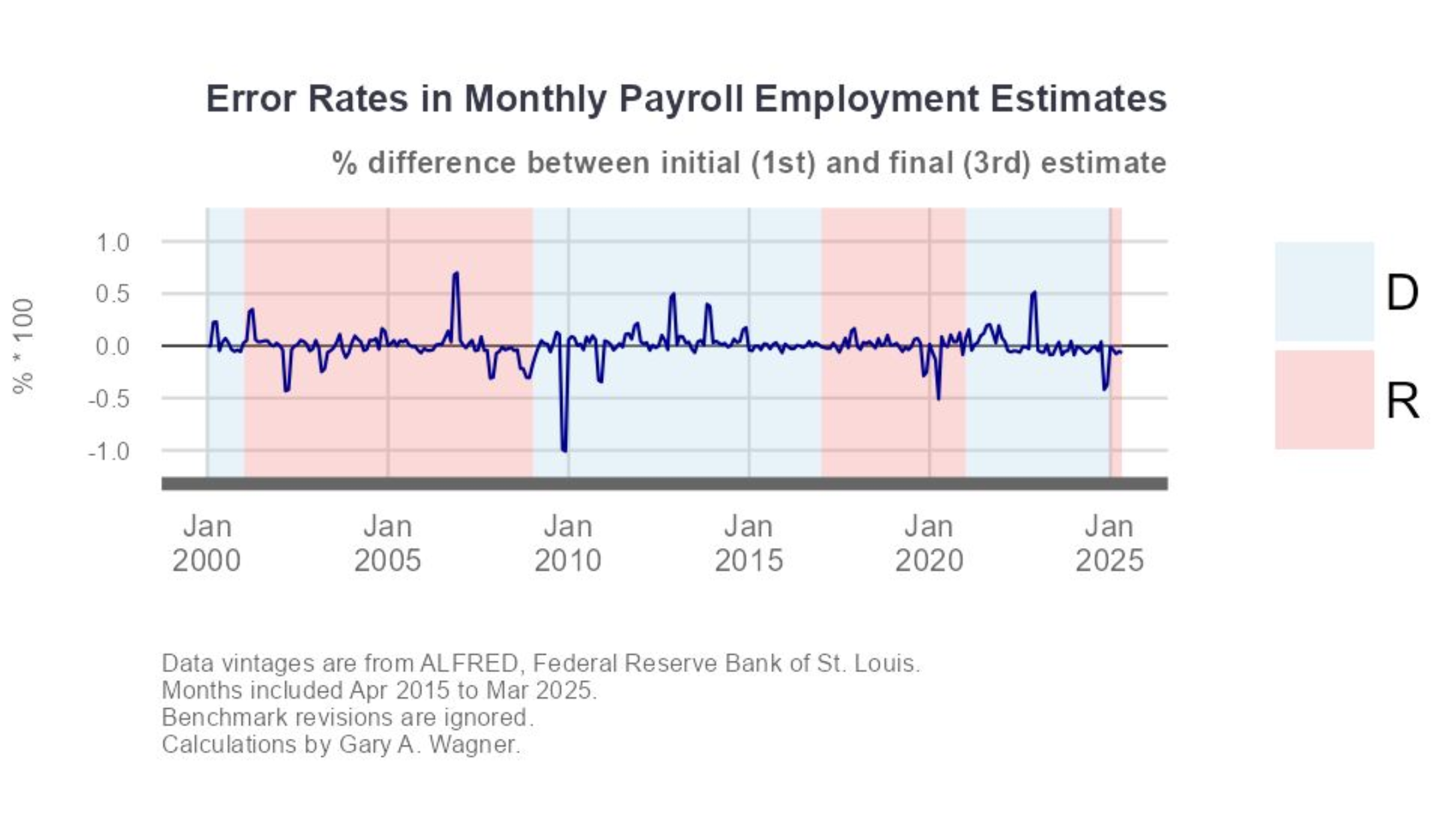
Finding consensus among economists is an occasional treat. Last week’s firing of Bureau of Labor Statistics (BLS) commissioner Erika McEntarfer by President Trump was one such occasion. With few exceptions, the reaction has been that the claims she was dismissed for producing “low-quality” data or displaying “partisanship” are mere cover — a simple case of machine-gunning the messenger.
There is little to substantiate the claim that the BLS produces low-quality data. The BLS (and every other statistical agency) frequently issues preliminary reports from surveys it conducts.
As such, revisions are common. How big are those revisions? Pretty small!
The graph below (courtesy of my co-author Gary Wagner at the University of Louisiana at Lafayette) shows error rates in monthly payroll employment estimates. It plots the percentage difference between the initial and final estimates. On this graph, a positive value means the initial estimate was lower than the final one. As can be seen, the errors (since 2000) are generally between ±0.5 percent. Most of the time (more than 90 percent), it’s within ±0.25 percent. On a pure absolute benchmark, this is not bad. In fact, if anything, the errors are getting smaller relative to the early period.
In the graph, the red and blue shaded areas represent the political party of the sitting US president. As can be seen, the errors don’t differ much by administration. The big spikes are what one could argue we should be looking at. Take the five instances where the difference is greater than ±0.5 percent. Two of those are clearly tied to economic shocks — the onset of a recession and the outbreak of COVID-19. Of the remaining three, one benefited a sitting Democratic president, one benefited a sitting Republican president, and one hurt a Republican president. Not particularly strong evidence of a “partisan” bias.

Graphic courtesy of Gary Wagner (University of Louisiana at Lafayette)
One more sophisticated answer would be to point to survey response rates. It is true that response rates in surveys such as the ones that underlie the highly publicized employment surveys have fallen in recent years. However, it is hard to pin this on the BLS’s own structure. Most countries are facing that problem.
In fact, my native Canada seems to be seeing more dramatic declines in survey response rates. In 2019, the response rate to Canada’s labor force survey was 87 percent. In 2023, it was down to 71 percent. This is quite telling since that survey is mandatory. On non-mandatory ones, such as the survey of household spending, the response rate is below 30 percent (compared to above 60 percent before COVID-19). In the European Union, the range of non-response varies between less than 3 percent (Denmark) to more than 60 percent (Luxembourg). In other words, the BLS is no better or worse than others (the worst indictment would be that it is a “middling” agency), and it faces the same issues as the others.
All of this says little about partisanship at the BLS. But here is a “dirty secret”: bureaucracies can’t afford to be partisan. This is something that the economics of bureaucracy teaches us.
An analogy to set the table is useful here. In the 1980s, the British Broadcasting Corporation (BBC) aired an immensely popular show entitled Yes, Minister, which told the story of a minister (in charge of the nebulous Department of Administrative Affairs) and his civil servant (known as a permanent secretary in Britain). The civil servant always acted deferentially toward the minister but, in reality, saw it as his mission to protect the civil service itself — and its interests. That often meant hoodwinking the minister.
In one famous episode, he’s speaking with another civil servant who asks whether they should actually believe in the policies they enact. The response is classic:
“I have served eleven governments in the past thirty years. If I had believed in all their policies, I would have been passionately committed to keeping out of the Common Market, and passionately committed to going into it. I would have been utterly convinced of the rightness of nationalizing steel. And of denationalizing it and renationalizing it. On capital punishment, I’d have been a fervent retentionist and an ardent abolitionist. I would’ve been a Keynesian and a Friedmanite, a grammar school preserver and destroyer, a nationalization freak and a privatization maniac; but above all, I would have been a stark, staring, raving schizophrenic”
The accumulation of avoided contradictions illustrates the point well: the bureaucracy sees whatever it does as the output — regardless of what that output actually is. Unlike private firms, however, bureaucratic agencies cannot extract profits. Thus, the “profit” of the bureaucrats comes from job security, salaries, prestige, perks (e.g., nice offices). All of these are tightly correlated with one thing: the size of the bureau’s budget. Thus, a bureaucrat’s primary goal is not to maximize efficiency or output — it is to maximize the agency’s budget, because that’s what increases their own utility.
Most importantly, bureaucrats have a certain ability to deflect politicians. They have more information than the political principals they report to. That allows them to exaggerate needs, withhold information, frame budget increases as necessary to avoid catastrophe, and present cuts as threats to public welfare. This asymmetry gives them a layer of insulation from both political pressure and accountability.
The potency of this insulation has limits, however. If the bureaucracy becomes “visibly” bloated, underperforming and inefficient, politicians and voters can react. This can lead to performance reviews, budget cuts, and firings. The same outcome can occur if the bureaucracy appears partisan. If voters perceive it as a biased player, they might become immune to threats of service reductions or insensitive to claims of catastrophe. In other words, the insulation is eaten away.
That is why bureaucratic agencies typically act to maintain a neutral façade. It strategically preserves the insulation. If they lose it, they risk real consequences — tighter oversight, performance audits, even calls for abolition. The underlying motive of preserving the interest of the bureaucracy requires avoiding subservience to a political party. It is why the civil servant in Yes, Minister could say that he helped implement all the contradictory policies he mentioned.
The claims that the BLS is systematically partisan and incompetent collapse under scrutiny.
Not only is the empirical evidence thin, but it is also a tenuous claim when one considers the economics of bureaucracies. For all their flaws, bureaucracies tend not to serve parties; they serve themselves.
To survive, they must appear neutral and stay above the fray. The moment they are seen as partisan tools, they lose the political cover that protects their budgets, their staff, and their relevance. In that sense, the best reason to trust the non-partisanship of agencies like the BLS is not their virtue, but their self-interest.
